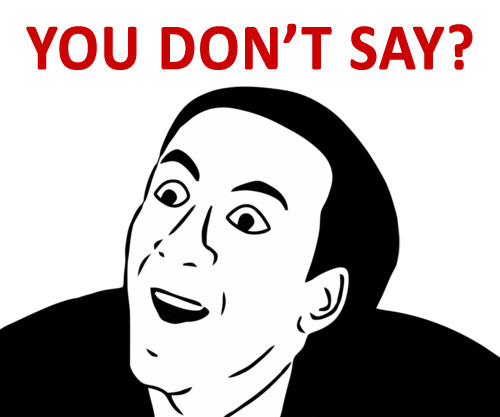Around the same people got their life guidance by books written by them.Daystar Clarion said:You mean the world really isn't going to end?

When did we start trusting the predictions of ancient civilisations anyway?
So quite some time.
Around the same people got their life guidance by books written by them.Daystar Clarion said:You mean the world really isn't going to end?

When did we start trusting the predictions of ancient civilisations anyway?
Even Sketch-Of-Nicolas-Cage-Performing-Best-Monologue-In-Cinema is jovial and non-chalant in his dismissal of the 2012 apocalypse. That's gotta burn the naysayers REEEAL good.Daystar Clarion said:You mean the world really isn't going to end?

When did we start trusting the predictions of ancient civilisations anyway?
Good post. I'd heard it explained before how the leap years didn't affect the calculations, but not enough to put it into a good post like you did.Therumancer said:good stuff
Actually we didn't. It's a misunderstanding that people have that the Mayans 'thought' the world was going to end in 2012, when in actual fact they didn't think this would happen. The actual truth is that this year marks the end of one of their units of time (2880000 days). It's kinda like the turn of the millenium for the Mayans, except that their particular time unit is roughly 8 millenia long. In a way people thinking that the world is going to end is a lot like the Y2K scare that went around in 1999.Daystar Clarion said:When did we start trusting the predictions of ancient civilisations anyway?
Actually, the Mayan 'year' is roughly five days shorter than our modern calendar year, being 360 days for mathematical consistency. The Mayans strived to form the perfect calendar by association days not only with the Sun, but also positioning of the stars, comets, etc. With that in mind, accounting for something like a leap day would only mess up their mathematical axioms anyway, so they didn't incorporate any.R Man said:I'd like to point out that the Maya did, in fact, know about the leap year. What exactly they did about it on the other hand is a mystery.
The real irony is that 2012 is completely arbitrary. When the Mayans were initially making their calendar they figured out that the earth was really old. So they just picked a random day in 3114 BC and went from there. The day the calendar ends is completely random, and the Maya knew it.
This.Agayek said:Technically, the Mayan calendar didn't actually end.Waaghpowa said:The fact that some people need evidence to put the end of the 2012 world into doubt is, in itself, horrifying.
From what I understand, the Maya believed time was cyclical, and marked by a "galactic cycle", which starts and ends when the progression of the equinoxes makes a complete revolution. In other words, when the Earth, Sun and galactic core are all in perfect alignment, which happens approximately once every 26,000 years.
The Mayan calendar for this cycle ends 12/21/2012, but then it starts right back up again in the new cycle. Basically, the Mayan used the progression of the equinoxes as a (significantly) larger version of a year. All this hysteria about it is functionally equivalent to our descendants finding the gregorian calendar and being convinced Dec 31 of any given year is the last day of all time.
